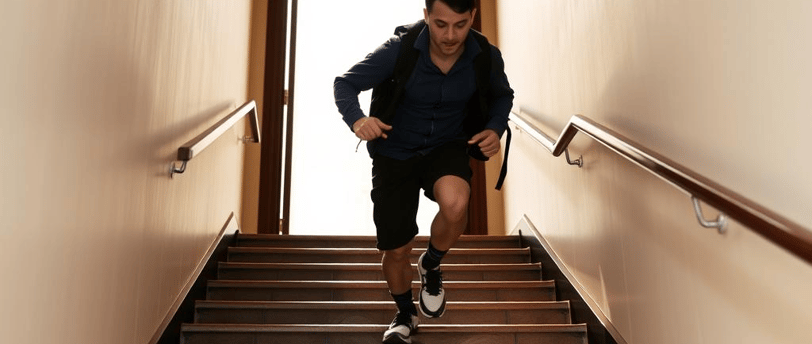Take the Stairs Instead of the Elevator – Small Habits Make a Big Difference
🧘WELLNESS TIPS🏃♂️ MOVEMENT & FITNESS


In today’s fast-paced world, convenience often dictates our choices. From drive-thru coffee to elevators in every office building, we continually seek ways to save time and energy. However, embracing small, intentional habits, like taking the stairs instead of the elevator, can lead to significant changes not only in our physical health but also in our overall well-being. This article dives deep into the benefits of this simple lifestyle change, provides practical tips on how to implement it, and explores how small habits truly do accumulate into larger, positive outcomes.
The Benefits of Taking the Stairs
1. Physical Health Improvements
Taking the stairs may seem like a minor decision, but it can greatly impact your physical health over time. Here are a few key benefits:
Burning Calories: Climbing stairs is a vigorous activity that can burn more calories than other forms of exercise. According to health experts, you can burn approximately five calories for every minute you spend climbing stairs. Over a week, this can add up to a significant caloric deficit.
Building Muscles: Stair climbing engages various muscle groups, including those in the legs, abdomen, and lower back. Regularly opting for the stairs can strengthen these muscles over time, contributing to better mobility and stability.
Cardiovascular Health: Engaging in regular physical activity, such as taking the stairs, is known to strengthen the heart. According to the American Heart Association, moderate aerobic activity, like stair climbing, can lower the risk of heart disease, stroke, and diabetes.
Better Joint Health: Contrary to popular belief, using the stairs is a weight-bearing exercise that can actually improve bone density and joint health, reducing the risk of osteoporosis as we age.
2. Mental Well-Being
Physical activity is not just good for the body; it also benefits mental health. Here’s how taking the stairs can uplift your mood:
Endorphin Release: Engaging in physical activity triggers the release of endorphins, the body's natural mood lifters. Regularly taking the stairs can enhance your mood and overall mental state.
Increased Productivity: Exercise, even mild forms like climbing stairs, can lead to improved concentration and cognitive function. A little bit of movement can reduce mental fatigue and help sharpen focus, leading to increased productivity at work.
Stress Reduction: Physical activity is a proven stress reliever. Climbing stairs can serve as a mini-break from a busy environment, allowing you to clear your mind while working toward your fitness goals.
3. Environmental Impact
Opting for stairs over elevators can also contribute positively to the environment:
Energy Savings: Elevators consume energy, and by reducing the frequency of their use, you help decrease energy consumption in buildings. Every small act counts toward lowering our carbon footprint.
Promoting a Sustainable Lifestyle: By integrating physical activity into daily routines, you promote a lifestyle that values health, sustainability, and connection to local environments.
How to Cultivate the Habit
If you’re convinced of the benefits and want to start incorporating more stair climbing into your life, here are some practical tips to make it easier:
1. Start Small
If you're not used to physical activity, don’t overwhelm yourself. Start by taking the stairs for just one or two flights. You can gradually increase this as your fitness improves.
2. Set Goals
Establish specific and realistic goals to keep you motivated. For instance, aim to take the stairs at least three times a week for a month. Track your progress to encourage consistency.
3. Find Accountability Partners
Involve friends or colleagues in your stair-climbing journey. You can support and motivate each other, making it more enjoyable. Forming a group can create a sense of community and shared commitment.
4. Make It Fun
Listening to music or podcasts while taking the stairs can transform the experience into something enjoyable. You could also challenge yourself with various goals, such as beating your time or counting how many flights you can conquer in a week.
5. Celebrate Your Success
Acknowledge your efforts and celebrate the milestones along the way, no matter how small. This can help reinforce the habit and make it more rewarding.
The Big Picture – Other Small Habits
Taking the stairs is just one of many small changes you can incorporate into your lifestyle. Here are a few more habits that, when practiced consistently, can result in substantial benefits over time:
Drink More Water: Replace sugary beverages with water to improve hydration and reduce calorie intake.
Practice Mindful Eating: Pay attention to your portions and the foods you consume. This can improve digestion and promote weight management.
Incorporate Short Walks: Aim for short walks throughout the day. Even a 10-minute break to walk around can refresh your mind and body.
Choose Whole Foods: Substitute processed foods with whole foods—fruits, vegetables, whole grains, and lean proteins—to enhance your nutrition.
Prioritize Sleep: Adequate sleep can vastly improve your health, mood, and productivity. Establish a consistent nightly routine to ensure restorative rest.
Conclusion
In a world driven by convenience and speed, choosing to take the stairs is a simple yet powerful habit that can foster both physical and mental well-being. By incorporating this micro-decision into your daily life, you can experience significant health benefits, strengthen your body, and improve your mood while making a positive impact on the environment. Remember, it’s the small habits, done consistently, that lead to big changes. So, the next time you’re faced with the choice between the elevator and the stairs, make the choice that will benefit you in more ways than one. Embrace the stairs—it’s a decision that could transform your health and life.
